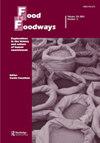Eating the Bubbe: Culinary encounters between secular and haredi jews in Bnei Brak
IF 1.1
Q2 ANTHROPOLOGY
引用次数: 3
Abstract
Abstract Over the last few years on Thursday evenings, the main streets of Bnei Brak, one of Israel’s largest haredi (ultra-Orthodox) cities, becomes a culinary meeting place. The Eastern European Jewish cuisine sustained by the haredi kitchen attracts non-haredi visitors to a society that tends to keep to itself. This article presents an ethnographic investigation of a new culinary scene that brings together local haredim and secular visitors. I draw upon the concept of “eating the other” to argue how the “haredi other” represents a complex kind of “otherness,” whose encounters with secular visitors simultaneously mark boundaries and cross them. These encounters demonstrate how culinary tradition can provide a link to collective memory and help build individual and group identities.吃泡泡:Bnei Brak世俗犹太人和哈雷犹太人之间的烹饪相遇
摘要在过去的几年里,星期四晚上,以色列最大的极端正统派城市之一Bnei Brak的主要街道变成了一个烹饪聚会场所。哈雷迪厨房所提供的东欧犹太美食吸引了非哈雷迪游客来到一个倾向于独处的社会。这篇文章对一个新的烹饪场景进行了人种学调查,将当地的哈莱姆人和世俗游客聚集在一起。我利用“吃掉另一个”的概念来论证“共享的另一个“是如何代表一种复杂的“他者”的,它与世俗访客的相遇同时标志着边界并跨越它们。这些相遇展示了烹饪传统如何提供与集体记忆的联系,并帮助建立个人和群体身份。
本文章由计算机程序翻译,如有差异,请以英文原文为准。
求助全文
约1分钟内获得全文
求助全文
来源期刊

Food and Foodways
ANTHROPOLOGY-
CiteScore
2.20
自引率
0.00%
发文量
16
期刊介绍:
Food and Foodways is a refereed, interdisciplinary, and international journal devoted to publishing original scholarly articles on the history and culture of human nourishment. By reflecting on the role food plays in human relations, this unique journal explores the powerful but often subtle ways in which food has shaped, and shapes, our lives socially, economically, politically, mentally, nutritionally, and morally. Because food is a pervasive social phenomenon, it cannot be approached by any one discipline. We encourage articles that engage dialogue, debate, and exchange across disciplines.
 求助内容:
求助内容: 应助结果提醒方式:
应助结果提醒方式:


